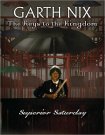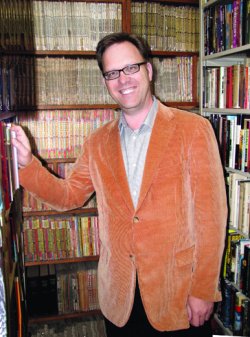Excerpts from the interview:
“People get too hung up on categories. Publishers, authors, and (to some extent) booksellers see Young Adult as a dynamic category: they want things to be in YA, whether they should go there or not. So there are books being rebranded as YA, books previously published for adults being reissued as YA, middle-grade children's novels being published as YA. And because no one really knows what YA is, you can do it to a large degree.
 “What is YA? It's different things to different people. People want to write for the category because they see it as somewhere they can sell books. Maybe things aren't working out on the adult side, so they see that as a new category to move into. I think there are a lot of people who are not genuinely interested in the audience as such; they're prepared to have a go at it because they think there's a marketplace. (Of course, they might still write good books, though I think it is less likely.)”
“What is YA? It's different things to different people. People want to write for the category because they see it as somewhere they can sell books. Maybe things aren't working out on the adult side, so they see that as a new category to move into. I think there are a lot of people who are not genuinely interested in the audience as such; they're prepared to have a go at it because they think there's a marketplace. (Of course, they might still write good books, though I think it is less likely.)”
*
“Harry Potter is children's fantasy, not YA, but it became YA toward the end. But it's in a separate category all its own: a phenomenon, and like all phenomena, it can't be repeated. Some of the lessons publishers and booksellers learned from Harry Potter have proved useful for other books. It's good that a children's or YA book can now be longer than 60,000 words, the length of a Heinlein juvenile (though I think the Heinlein juveniles are model YA books in many ways).
“Before it sold in 1995, my Sabriel was rejected by three or four New York publishers as being too long at 90,000 words! So it's good that Potter has opened up the length constraints. The bad thing is the classic of learning the wrong lesson. Did Harry Potter sell because they're long books? Well, no. But some publishers thought, 'OK, it works because it's huge, and kids like a long reading experience.' Younger readers are the same as older readers, they only want a long reading experience when they love the book and want to spend more time in it.”
*
 “When I'm writing, I tend to visualize the scenes and then try to describe the scene that's in my head as best I can in words. It's all about trying to make it real in different ways, all about story. Sometimes the influence of the real world is quite overt. I have a story in the charity anthology War Child (also in my collection Across the Wall), 'Charlie Rabbit', about two kids trapped in a collapsed house in a war zone, and I have two small boys. It was my fears being projected into that story. It's science fiction of a kind, but it's also a very contemporary story that could be set anyplace where there are cities being bombed -- which unfortunately is, quite often, lots of places. I could have deliberately made it Iraq or Israel, Chechnya five years ago, or whatever, but I actually prefer not to. It's more universal if it can be anywhere.”
“When I'm writing, I tend to visualize the scenes and then try to describe the scene that's in my head as best I can in words. It's all about trying to make it real in different ways, all about story. Sometimes the influence of the real world is quite overt. I have a story in the charity anthology War Child (also in my collection Across the Wall), 'Charlie Rabbit', about two kids trapped in a collapsed house in a war zone, and I have two small boys. It was my fears being projected into that story. It's science fiction of a kind, but it's also a very contemporary story that could be set anyplace where there are cities being bombed -- which unfortunately is, quite often, lots of places. I could have deliberately made it Iraq or Israel, Chechnya five years ago, or whatever, but I actually prefer not to. It's more universal if it can be anywhere.”
*
“With film adaptations of my books, instead of just selling options I've always taken the packaging path of teaming up with people: director, writer, producer. That's proven to be a very difficult and long road, but I think that while it does not improve the chances of getting a film made, if one is made, it should increase the chances of making a better film.
 “Sabriel is the first one of my books where the 'package' has come together. I'm co-writing the screenplay with Dan Futterman, the well-known actor and screenwriter who was nominated for an Oscar for his screenplay of Capote. Anand Tucker is attached to direct. I love his film Hilary and Jackie amongst others, and he was also the director on The Golden Compass for some time before he left over creative differences, as they say. The production company is Plan B, Brad Pitt's company.
“Sabriel is the first one of my books where the 'package' has come together. I'm co-writing the screenplay with Dan Futterman, the well-known actor and screenwriter who was nominated for an Oscar for his screenplay of Capote. Anand Tucker is attached to direct. I love his film Hilary and Jackie amongst others, and he was also the director on The Golden Compass for some time before he left over creative differences, as they say. The production company is Plan B, Brad Pitt's company.
“We're in development now, writing the script while Anand is engaged in the 'pre-visualisation' of story-boards, effects planning and so on. When this is all done, we hope the film will be green-lit and go ahead, but of course, it may not.”




